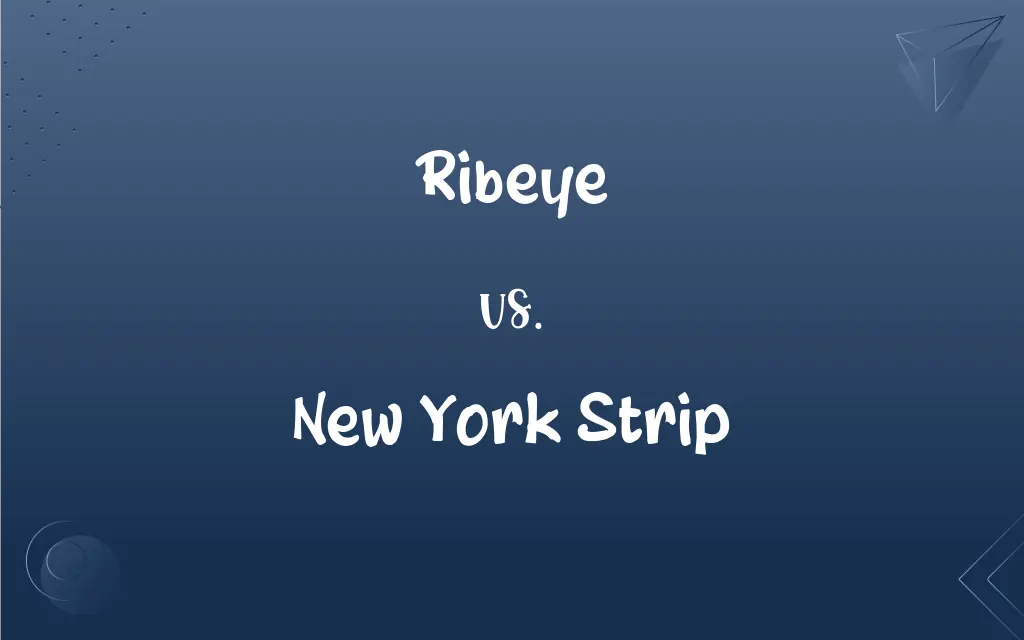Ribeye vs. New York Strip: What's the Difference?
Edited by Aimie Carlson || By Harlon Moss || Updated on October 22, 2023
Ribeye is a beef steak from the rib section, known for its marbling; New York strip is a tender steak from the short loin, with less fat.

Key Differences
Ribeye, sourced from the rib portion of the cow, is celebrated for its rich marbling, which imparts juiciness and flavor. New York strip, on the other hand, comes from the short loin area and presents a more uniform texture without the pronounced marbling.
While ribeye boasts a more buttery taste due to its fat content, New York strip offers a beefier and leaner flavor profile. Both cuts are cherished, but the ribeye often renders a more tender bite due to its marbling, while the New York strip delivers a slightly chewier experience.
The appearance of ribeye and New York strip is also distinguishable. A ribeye generally has a more rounded shape with evident fat marbling throughout. Conversely, a New York strip is typically more elongated with a strip of fat running along one side.
Preparation and cooking techniques may vary between ribeye and New York strip. The ribeye's marbling means it's less likely to dry out when cooked, while the New York strip might benefit from marination or careful monitoring during cooking to ensure it doesn't become too dry.
Price points can differ based on the cut. Ribeyes might sometimes command a higher price due to their marbling and resultant tenderness. The New York strip, although premium, can be a bit more affordable in some markets.
ADVERTISEMENT
Comparison Chart
Part of the Cow
Comes from the rib section.
Sourced from the short loin.
Texture
Marbled, more fat content.
Leaner, uniform texture.
Shape
Generally rounder.
More elongated with fat on the side.
Taste
Buttery due to fat.
Beefier and leaner.
Price
Often pricier due to marbling.
Usually a bit more affordable.
ADVERTISEMENT
Ribeye and New York Strip Definitions
Ribeye
A steak cut from the rib section.
The ribeye steak is known for its rich flavor and tenderness.
New York Strip
A steak from the short loin.
He ordered a New York strip medium-rare.
Ribeye
Celebrated for its marbling.
He chose the ribeye because of its evident fat marbling.
New York Strip
Typically has a strip of fat on one side.
The New York strip's fat edge crisped up nicely on the grill.
Ribeye
Has a buttery flavor due to fat content.
The ribeye's buttery taste made it the favorite at the BBQ.
New York Strip
Less marbling than ribeye.
He preferred the New York strip's leaner profile to the ribeye.
Ribeye
Often round in shape.
The ribeye had a characteristic rounded appearance on the grill.
New York Strip
Often elongated in shape.
The elongated New York strip steak was grilled to perfection.
Ribeye
Prized for its tenderness.
Among all the steaks, the ribeye was the most tender.
New York Strip
Known for its beefy, lean flavor.
The New York strip had a robust beefy flavor that stood out.
Ribeye
Ellipsis of ribeye steak}}; {{qualifier
Ribeye
Synonym of ribsteak}} {{gloss
Ribeye
A run batted in.
Watson had a 3-run homer and a 2-run double for a total of five ribeyes on the night.
FAQs
From which part of the cow is the ribeye sourced?
Ribeye is cut from the rib section of the cow.
Are ribeye and New York strip both premium cuts?
Yes, both are considered premium beef cuts.
Which steak is more tender, ribeye or New York strip?
Ribeye is often more tender due to its marbling.
Can I pan-sear both ribeye and New York strip?
Absolutely, both steaks sear well in a hot pan.
How does the New York strip get its name?
It's named after the New York restaurants that popularized the cut.
Should I marinate a New York strip?
It's optional, but marinating can enhance flavor and tenderness.
Are there bone-in versions of the New York strip?
Yes, it's available both bone-in and boneless.
How thick should a New York strip be for best cooking results?
Typically, 1 to 1.5 inches thick is ideal.
Which has more fat: ribeye or New York strip?
Ribeye typically has more marbling and fat.
Is New York strip also called something else?
Yes, it's sometimes referred to as a "strip steak" or "Kansas City strip."
Are ribeye steaks typically more expensive?
Often, ribeyes might be pricier due to their rich marbling.
How should I season a ribeye compared to a New York strip?
Both benefit from basic seasoning like salt and pepper, but ribeye's fat can also complement herbs and garlic.
Why is ribeye sometimes called a "Delmonico" steak?
It's named after Delmonico's, a New York restaurant that popularized this cut in the 19th century.
Can you cook ribeye and New York strip the same way?
Both can be grilled, but ribeye's fat content may affect cooking time and technique.
Which steak is leaner, ribeye or New York strip?
New York strip is generally leaner than ribeye.
Do both steaks pair well with red wine?
Yes, both pair excellently with red wine, especially robust varieties.
How do I know a good quality ribeye?
Look for a steak with good marbling and a bright red color.
Which is juicier, ribeye or New York strip?
Due to its marbling, ribeye is often juicier.
Which is larger, ribeye or New York strip?
Sizes vary, but ribeyes might often appear larger due to their rounded shape.
Is the fat in ribeye good for grilling?
Yes, the fat in ribeye can enhance flavor when grilling.
About Author
Written by
Harlon MossHarlon is a seasoned quality moderator and accomplished content writer for Difference Wiki. An alumnus of the prestigious University of California, he earned his degree in Computer Science. Leveraging his academic background, Harlon brings a meticulous and informed perspective to his work, ensuring content accuracy and excellence.
Edited by
Aimie CarlsonAimie Carlson, holding a master's degree in English literature, is a fervent English language enthusiast. She lends her writing talents to Difference Wiki, a prominent website that specializes in comparisons, offering readers insightful analyses that both captivate and inform.































































